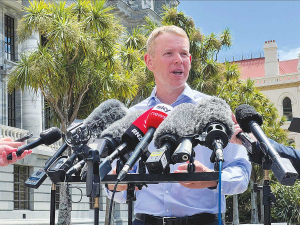Editorial: Fireworks or damp squib?
OPINION: November 7 has been set by Christopher Luxon as ‘E day’ – election day.
 Prime Minister Chris Hipkins says the FTA will increase NZ exports to the EU by up to $1.8 billion per year.
Prime Minister Chris Hipkins says the FTA will increase NZ exports to the EU by up to $1.8 billion per year.
Fruit and vegetable farmers and beekeepers are welcoming the signing of the Free Trade Agreement (FTA) with the European Union (EU) today.
The agreement was signed overnight and sees the elimination of tariffs on numerous products, including kiwifruit, Manuka honey, fish and seafood, onions, wine, and industrial products.
Prime Minister Chris Hipkins says the FTA will increase NZ exports to the EU by up to $1.8 billion per year by 2035.
“Tariff savings on New Zealand exports are $100 million from day one of the agreement entering into force, the highest immediate tariff saving delivered by any New Zealand FTA. That’s around three times the immediate savings from the UK FTA,” Hipkins says.
Minister for Trade and Export Growth Damien O’Connor says the FTA will cut costs and support exporters to grow and diversify trade.
“Based on current trade figures New Zealand will have the opportunity through combined FTA and WTO quotas to provide up to 60 percent of the EU’s butter imports – up from 14 percent today. New Zealand cheeses could also make up 15 per cent of the EU’s imported cheeses, up from 0.5 percent today, which is no mean feat for a small nation like ours,” O’Connor says.
Onions New Zealand chief executive James Kuperus says the EU is the number one market for New Zealand onion exports.
“Tariff savings of 9.6% puts the New Zealand onion industry on a level footing with competitors such as Chile and South Africa,” Kuperus says.
“I’d like to thank officials in New Zealand and the EU for supporting export industries like onions which play a key role in regional economies across New Zealand. Growers from South Auckland to Canterbury will benefit from this FTA,” he says.
“It is now important that the New Zealand Government post-election passes the necessary legislation to bring this FTA into effect so producers and exporters can make use of it next season.”
 |
|---|
|
Onions New Zealand James Kuperus |
Apiculture New Zealand is also welcoming the signing, saying it takes the sector one step closer to the removal of tariffs on all New Zealand honey into the EU.
“We are thrilled that the agreement also includes the definition of mānuka and a separate tariff recognising the inherent distinctiveness of mānuka as a taonga species exclusively from Aotearoa New Zealand,” says Karin Kos, chief executive of Apiculture New Zealand.
“The EU’s recognition of mānuka as a taonga species is significant in helping progress the next step in securing geographical indications for mānuka honey, an initiative that is strongly supported by both industry and iwi,” she says.
“The EU is an important market for New Zealand honey exporters and we have a long history of exporting high-quality honey products there. However, the current in-quota tariff rate of 17.3 per cent has been a significant barrier to trade.
The tariff will come off mānuka honey as soon as the agreement comes into force. All remaining New Zealand honeys will see the tariff removed after three years and this will help their competitiveness in market,” says Kos.
New Zealand Horticulture Export Authority chief executive Simon Hegarty says the signing of the FTA is “warmly welcomed”.
“The sign-off of the text confirms there is no going back on the agreement announced just over one year ago,” Hegarty says.
 |
|---|
|
New Zealand Horticulture Export Authority chief executive Simon Hegarty. |
He says news of the FTA provides a sizeable lift for future prospects against the current backdrop of significant production challenges in exporting perishable products and geopolitical uncertainties.
“The removal of trade distorting tariffs flowing from this agreement will be a boost for the NZ horticulture export sectors by levelling the pitch with other southern hemisphere countries.”
Hegarty says EU consumers will benefit from the agreement enabling better security of access for healthy New Zealand food products.
“With annual export value to the EU ranging from NZ$918m - $1.0b over the past three years and tariffs ranging from zero to 20% (depending on the item), the removal of tariffs on trade with the EU will provide an estimated benefit of approximately NZ$70m annually.”
The sale of Fonterra’s global consumer and related businesses is expected to be completed within two months.
Fonterra is boosting its butter production capacity to meet growing demand.
For the most part, dairy farmers in the Waikato, Bay of Plenty, Tairawhiti and the Manawatu appear to have not been too badly affected by recent storms across the upper North Island.
South Island dairy production is up on last year despite an unusually wet, dull and stormy summer, says DairyNZ lower South Island regional manager Jared Stockman.
Following a side-by-side rolling into a gully, Safer Farms has issued a new Safety Alert.
Coming in at a year-end total at 3088 units, a rise of around 10% over the 2806 total for 2024, the signs are that the New Zealand farm machinery industry is turning the corner after a difficult couple of years.

OPINION: Meanwhile, red blooded Northland politician Matua Shane Jones has provided one of the most telling quotes of the year…
OPINION: This old mutt has been around for a few years now and it seems these ‘once in 100-year’ weather…